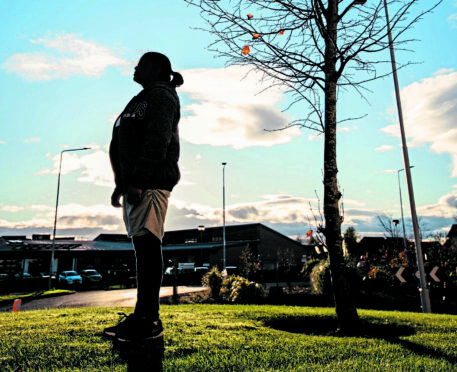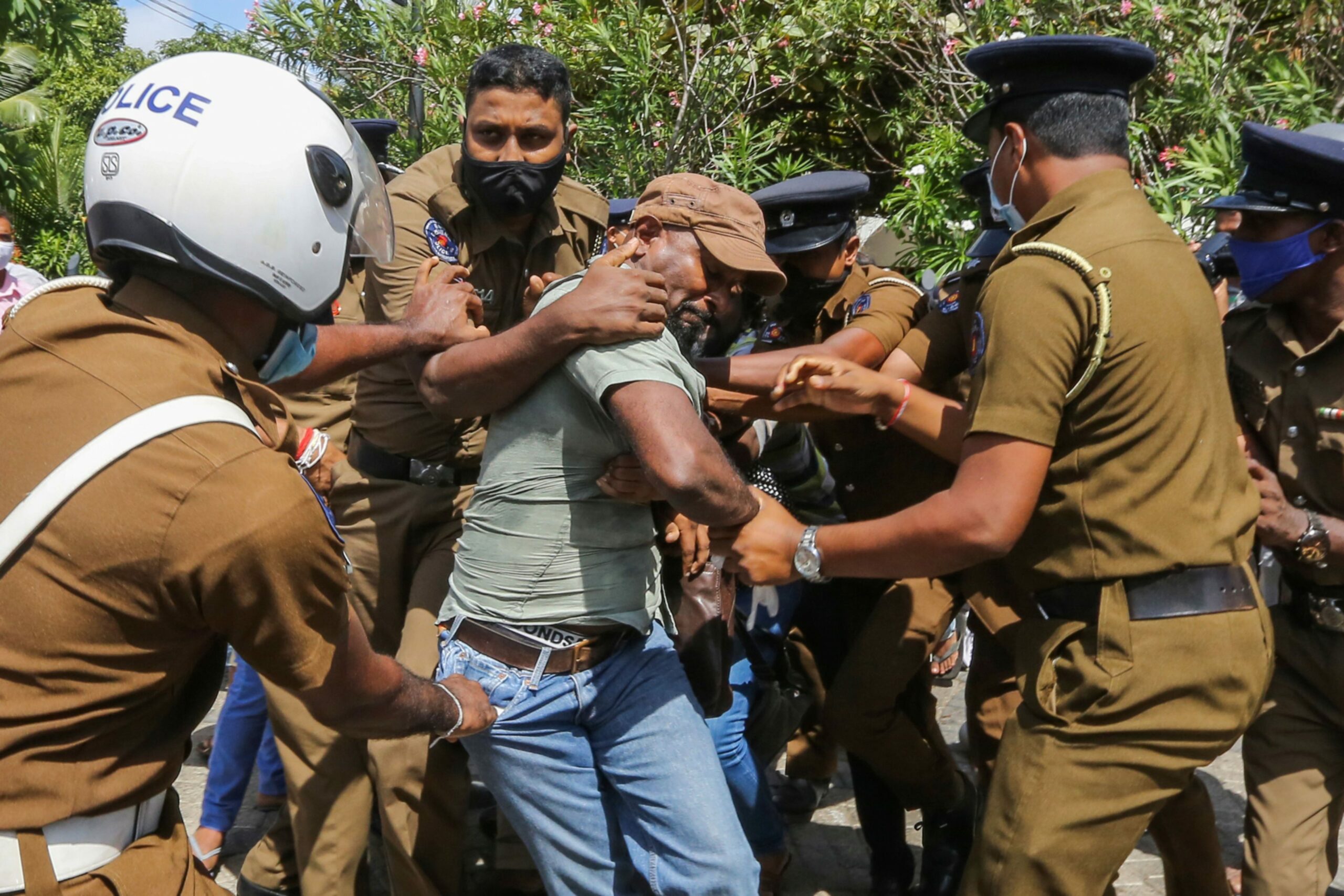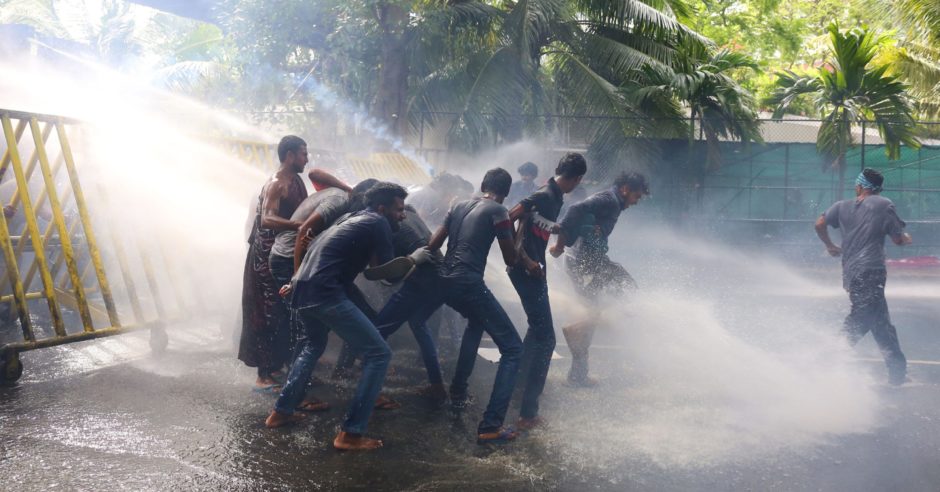
Police Scotland must stop training Sri Lankan officers if allegations of state-sanctioned torture are confirmed, according to the UN investigator behind an excoriating report into the country’s human rights abuses.
Professor Manfred Nowak, a former United Nations Special Rapporteur on human rights, called for Holyrood to launch an inquiry into the claims of police brutality made by refugees fleeing Sri Lanka for Scotland.
If their claims are established, he said, Scotland’s national force must end its controversial training of Sri Lankan police and special units.
Police Scotland insists its international training improves world policing but critics fear the force has been naive to work with the government in Colombo while its tacit endorsement is helping whitewash the torture, abduction and murder of ethnic minority Tamils.
The long-standing police training programme – which has involved Sri Lankan officers, including some later linked to systemic torture, being trained at Police Scotland’s Tulliallan HQ and Scots officers travelling to Colombo – is currently in limbo while being reviewed by the Foreign Office.
MSP Mercedes Villalba has now written to the British High Commission in Sri Lanka voicing concern that Police Scotland’s training of Sri Lankan police has gifted the Colombo regime “an unwarranted legitimacy” and is “a smokescreen for human rights abuses”.
Yesterday, Nowak, a leading human rights lawyer and secretary general of the Global Campus of Human Rights, said it was alarming that torture techniques he exposed for the UN in 2007 are allegedly still being used and he urged Police Scotland to instigate a criminal investigation into the claims of refugees from Sri Lanka.
He told The Post: “The Scottish Parliament should hold an inquiry and Police Scotland must investigate these allegations of torture and participate with the police in Sri Lanka to prosecute the perpetrators.
“If Sri Lanka does not co-operate or seek to prosecute, then this matter should be brought before the international courts as cases have been in the past.”
He said the testimonies of torture victims who have fled to Scotland in fear of their lives were strikingly similar to the allegation he uncovered in Sri Lanka 14 years ago: “The use of practices such as hanging victims from their limbs, or even their fingers, was something I encountered, as was the use of plastic bags with petrol.
“If there is evidence which shows these practices are being used by the police in Sri Lanka, then Police Scotland need to step away from any future training programmes.”
MSPs have backed Nowak’s call for a parliamentary inquiry. Scottish Lib Dem leader Alex Cole-Hamilton echoed his concerns and said: “Any continuation of the training arrangement Police Scotland has with Sri Lanka brings us worryingly close to a complicit relationship with people who we now know are committing torture and rape on an industrial scale.
“I very much want to hear from these torture victims and support calls for an inquiry by our Justice Committee and a police investigation.”
Labour’s Shadow Justice Secretary Pauline McNeill said: “It’s vitally important victims of torture and human rights abuses know we are watching and listening.
“I believe we will have strong cross-party support for Scotland to take a stance against these human rights violations.”
Nowak’s remarks were welcomed by human rights campaigners. Marion Pallister, of peace movement Pax Christi Scotland, said: “We hope this may be the first move towards getting justice for Sri Lanka’s torture victims.”
Frances Harrison, of the International Truth and Justice Project, said: “If Scotland took these groundbreaking steps they would lead the way across the world by showing the perpetrators of torture cannot escape their crimes.
“A parliamentary inquiry would act as a beacon of light to the thousands of victims of torture who live in silence and fear around the world, and send an important message to Sri Lanka that their actions will not be tolerated.”
In February Amnesty International published a damning report detailing how Sri Lankan government officials repeatedly attacked and targeted human rights campaigners, lawyers representing families of the disappeared and political opponents.
Naomi McAuliffe, director of Amnesty international UK Scotland said: “We have asked to see evidence that Police Scotland takes human rights into consideration before entering into any overseas training agreement and have received no assurances.
“There has to be consideration not only of whether overseas forces have been involved in human rights abuses but how Police Scotland’s involvement might contribute towards helping other forces to conceal or downplay their human rights atrocities.”
Meenakshi Ganuly, of Human Rights Watch, urged UN countries to speak out, adding: “Since Rajapaksa took office, the limited progress Sri Lanka had made in addressing atrocities and ending abuses has been disastrously reversed.
“Continued international attention and pressure can help reduce the risks faced by minority communities, activists, and journalists, who live in heightened fear of the authorities.”
Human Rights Watch says a newly formed board of three presidential appointees to review pretrial detention orders in Sri Lanka means there is no credible legal protection against abuse.
Despite previous promises to investigate disappearances, Rajapaksa appointed his own judges to the Office of Missing Persons. One appointee is a former inspector general of police accused of destroying evidence in the murder of a journalist.
Assistant Chief Constable Gary Ritchie said: “Police Scotland does not have the jurisdiction to investigate crimes committed by Sri Lankans in Sri Lanka.
“In May 2021, Police Scotland decided to pause activity in relation to Sri Lanka. All UK assistance abroad is subject to robust Overseas Security and Justice Assistance (OSJA) assessments to ensure that it supports our values and is consistent with our domestic and international human rights obligations.
“The OSJA relating to Police Scotland’s activity in Sri Lanka is currently under review, hence the pause in our work there. As an organisation, we regularly review the overarching situation in all the countries we work with through the appropriate governance and oversight mechanisms.
“Police Scotland’s values of integrity, fairness, respect and a commitment to upholding human rights are at the heart of everything we do.
“This includes our work in Sri Lanka, which supported the realisation of the UN Sustainable Development Goals, particularly gender equality, reduced inequality, peace and justice, strong institutions and partnerships to achieve the goals.”
The Scottish Government said: “Any decision on whether to hold a parliamentary inquiry would, of course, be for the Scottish Parliament.
“It is a matter for the chief constable of Police Scotland to agree the details of any training programme in Sri Lanka, with oversight and scrutiny of his decisions being provided by the Scottish Police Authority.
“The programme is funded by the UK Government, through the Foreign, Commonwealth and Development Office and we understand that the work in Sri Lanka, which was initially paused due to coronavirus, is now under review.”
Our terror. Our torture
Three Sri Lankan refugees who fled to Scotland after allegedly suffering torture at the hands of the police and special forces describe their ordeal today. Their names have been changed
Deleena’s Story
They had come for her father, a shopkeeper, but when he did not return home quickly enough for the Sri Lankan police officers who besieged her family home on January 2, they took Deleena.
As her mother, a teacher, wept and begged, neither woman knew if they would ever see each other again. What followed were five days and nights of atrocity.
She said: “I was blindfolded, my arms were handcuffed behind my back. I was thrown face down into a white van and driven away. I screamed and cried. I knew I would be lucky to survive. So many others have not.
“I was questioned by CID officers for hours at a time about my father and his support for other Tamils. They beat me with sticks and plastic pipes filled with sand. They punched and kicked my stomach, my breasts.
“A polythene bag with petrol was tied over my head. I didn’t know if I’d be set on fire or asphyxiated. I blacked out.
“When I awoke I was raped and sexually abused again and again.”
Her release five days later only came when her family paid a bribe. She was alive at least, but the physical torture has inflicted enduring psychological injuries.
Coshel’s Story
He did not know from second to second whether he would die, suffocated by the plastic bag over his head or burned alive by the petrol poured inside it.
Coshel’s abuser remained silent, allowing his victim’s emotions to swing wildly between two horrible possibilities.
That silence, that uncertainty is said to have become a hallmark of torture. He was hung from his ankles and savagely beaten with batons and pipes filled with sand until pain rendered him unconscious.
He suffered rapes, sexual torture and beatings so severe his body is riddled with scars. Coshel said: “I was taken and tortured twice. The first time was in 2011. I was just a teenage boy. The second time was in 2019. I know I can never return home. If they take me again, next time I believe they will kill me.
“Tamil families live in terror every day. The children have no childhood. There is always the threat and real fear their parents or relatives will be taken away and killed. Thousands have lost their lives.
“The government have no humanity towards Tamil people. To them, we are worthless. I do not believe Scotland would approve of how we are treated in Sri Lanka.”
Henith’s Story
Henith described being raped day after day by three of his torturers, continually beaten, branded all over his body with lit cigarettes and hot metal bars, and choked until he became unconscious.
His body retains deep physical scars and he still cannot stand for long because of beatings to his bare feet, a torture known as Falanga.
This man’s crime was attending a ceremony to remember the thousands of disappeared Tamils in Sri Lanka. Although now in Scotland, he still does not feel safe because he does not know if his asylum claim will be granted. If his application is refused, he cannot return to Sri Lanka as he is sure he will be killed. He says he would rather take his own life than return.
Henith said: “They said they were CID officers. I thought they were going to kill me and my family would never know what happened to me during the 15 days and nights I was held in January 2019.
“They demanded I become an informer. I refused and was beaten and sexually abused again and again. My head was beaten and kicked. Blood came from my ears. I still cannot hear properly.
“I was so badly beaten, I signed a confession agreeing to everything they accused me of so the beatings would stop. I’m only alive because my family paid a bribe to get me free.”

Enjoy the convenience of having The Sunday Post delivered as a digital ePaper straight to your smartphone, tablet or computer.
Subscribe for only £5.49 a month and enjoy all the benefits of the printed paper as a digital replica.
Subscribe © CHAMILA KARUNARATHNE/EPA-EFE/Shutterstock
© CHAMILA KARUNARATHNE/EPA-EFE/Shutterstock © Krishan Kariyawasam/Pacific Pres
© Krishan Kariyawasam/Pacific Pres